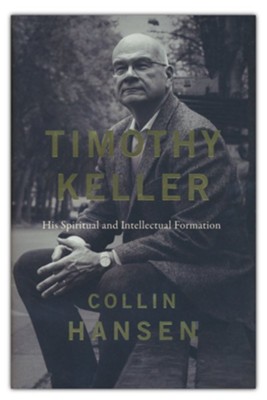
Comments? Constructive remarks? Want to discuss something offline? Drop me an email
Thoughts on Christianity
and the Church
July 16 2023: Timothy Keller Biography
 There are a number of recent church pastors that I think are significant due to what they have done for setting trends or at least being exemplars in the contemporary Protestant world. These would include Rick Warren (of Saddleback Church; "Purpose-Driven Church"), Jim Cymbala (of Brooklyn Tabernacle, and the focus on prayer that resurrected his dying church), and Tim Keller (of Reedemer Presbyterian in Manhattan). Tim is also a founder and key contributor of The Gospel Coalition [1], a website that I find very helpful in general, and for its Reformed perspective in particular. Keller is an accomplished author in his own right, and I've read The Reason for God [2] and found it very good. Tim Keller died of cancer this year in May, and I've been motivated to read his biography by Collin Hansen [3].
There are a number of recent church pastors that I think are significant due to what they have done for setting trends or at least being exemplars in the contemporary Protestant world. These would include Rick Warren (of Saddleback Church; "Purpose-Driven Church"), Jim Cymbala (of Brooklyn Tabernacle, and the focus on prayer that resurrected his dying church), and Tim Keller (of Reedemer Presbyterian in Manhattan). Tim is also a founder and key contributor of The Gospel Coalition [1], a website that I find very helpful in general, and for its Reformed perspective in particular. Keller is an accomplished author in his own right, and I've read The Reason for God [2] and found it very good. Tim Keller died of cancer this year in May, and I've been motivated to read his biography by Collin Hansen [3].
The book covers Keller's life from his origins in Pennsylvania. A good part of the book describes his education and his faith journey from his legalistic, graceless Evangelical Congregational Church background through his exposure to InterVarsity at Bucknell University and his subsequent attendance at Gordeon-Conwell Theological Seminary. It goes into the thought leaders who shaped Keller, such as John Stott, Jonathan Edwards (and other Puritan writers), C.S. Lewis (with whom is wife, Kathy, had sustained a correspondence in her younger days), Ed Clowney, Elisabeth Elliot, R.C. Sproul and the Ligonier Valley Study Center (Sproul performed their marriage ceremony), Francis Schaeffer (whose L'Abri was the model for Ligonier and for much of what Keller wanted to do with Redeemer), and many others. It progresses to his first pastoral role at Hopewell, Virginia, and the lessons he learned there, and then to his brief stint as a professor at Westminster Theological Seminary. Of course, the jewel of his life was Redeemer Presbyterian in Manhattan, New York City. For me, the intellectual and theological development of his early life, and the theory, goals, and practice of Redeemer, were the high points of this book.
There are a few warts. I knew Keller was an Old-Earther, but the book makes mention of this only in passing:
"By his 1975 graduation from Gordon-Conwell, most of Keller's enduring theological commitments had been settled. He subscribed to the Westminster Standards and Presbyterian-Reformed theology. He advocated for penal substitution, classic covenant theology, amillennialism, and what would later come to be known as a "complementarian" view of gender roles in the home and church. He believed in a historic, specially created Adam and Eve, in an old earth, and in the reality of biological evolution. He aligned with the neo-Calvinist approach to culture that combined evangelism and social justice. He resisted tying the church to one political agenda. He wanted the church to approach homosexuality with pastoral care without compromising the biblical sexual ethic. He prayed for the kind of revival Edwards saw in his day. (p. 103)
For all his theological training, he never once encountered any objection to the "billions of years" and "goo-to-you" evolution which is the origin story of atheism. He sure didn't get that stuff from the Bible. Obviously his teachers at the seminary only reinforced this anti-inerrant-Bible concept. I'm sure he heard from the Young-Earth side during his years at Redeemer; he's certainly been the subject of creationist commentary then and now, but he never reflected on what it means to the larger story in the Bible. At least, he was not a fervent Old-Earth advocate like Hugh Ross and William Lane Craig.
Also, as a point of annoyance: Hansen keeps using the term "justice", or even "social justice", when refering to works for the poor. "Justice" is something due to the interested party by virtue of their standing as a human. "Justice" is to have those who injure someone else held to account. "Justice" is something properly owed. Helping someone in bad circumstances is "compassion", not "justice". The Good Samaritan provided "compassion" to the injured man; he didn't do what he did because he was somehow obligated to do so. Using this term "justice" gives away too much to the current Zeitgeist. Better to use the term "mercy ministries", as he does elsewhere." Example of this use on p. 158. Apparently, Keller used the term himself.
Keller's involvement with The Gospel Coalition (TGC) appears to have been something he did "on the side" while at Redeemer (see pp. 169-173). While interesting, of course, the book describes the motive of "orthodox, pious, and culturally astute", to balance emphasis on the doctrinal, emotive, and good works of Christian religion and to avoid "the gap that widened as Americans split between fundamentalists and modernists", which I find particularly refreshing. This theme recurs in various places in the book.
Finally, some remarks about other ideas that I found of particular interest.
Some years after being at Redeemer, Tim and Kathy Keller were invited to a reception for their work at Hopewell. The book states, "not a single person mentioned anything he had preached. No one quoted a sermon. But several members recalled something he said to them privately in counseling and visitation." "'To the degree that people knew he cared, to that degree and that degree only, were they interested in what he ahd to say from the pulpit'" (p. 121)
Preaching isn't the all-important thing that preachers think it is. Keller was trained as a preacher, all his seminary teachers were preachers who thought preaching was the One True Essential for pastoral work. But for all the effort Keller put into his sermons, even bringing himself to the point of burnout at Hopewell... not much was gained. It's the personal involvement, the "reprove, rebuke, exhort" of 2Tim 4 that does the work of the pastor in the church. As seen elsewhere here, I'm not sure what "preaching" is, I'm really thinking it's more like public evangelism to crowds (as Peter and Paul did in Acts) than delivering a sermon to the church people on Sunday morning (a pattern which isn't even approximately described in Scripture), but I'm convinced it's not nearly as effective or necessary as church culture and trained preachers think it is. From the book, I pick up that it was Redeemer's lay-led ministries and Keller's post-service "gabfests" that held the most influence.
Redeemer was a start-up, not a church transition, with forty young Christians in the core (p. 186). There was no institutional baggage to deal with. There was liberty to do what needed to be done. Nobody had any pre-conceived mandates about how to "do" church. In Purpose-Driven Church, Warren explains how difficult it is to transition an established church over the assumptions and expectations of an existing congregation. Again, "In less than thirty months, Redeemer attendance grew from zero to one thousand. The church began with Sunday afternoon meetings for prayer and vision... Redeemer held its first service on Palm Sunday, April 1989" (p. 202). I keep thinking I would like to be part of a start-up like Redeemer. It's just that all the start-ups I've encountered in Tucson invariably assume the church-culture "put on a show on Sunday morning" that is apparently both the church planters' assumption and the expectation of the denomination providing the funding. I would despair of a reformation in established churches in the West without a move of God. Of course, even in Luther's and Calvin's day, the Lutheran and Reformed churches were essentially from-scratch start-ups, even if they occupied repurposed Catholic buildings.
And lastly, Keller having been a prolific author, there is frequent mention of Keller's other books, and especially of Center Church [4]. Something to follow up on (except my backlog of books and magazines is already so deep...).
I should mention that, of course, Redeemer has its own website [5], and The Gospel Coalition hosts The Keller Center for Cultural Apologetics [6].
. . . . . . . . . . . . . . .
2. timothykeller.com/books/the-reason-for-god
4. timothykeller.com/books/center-church